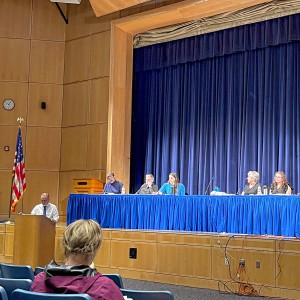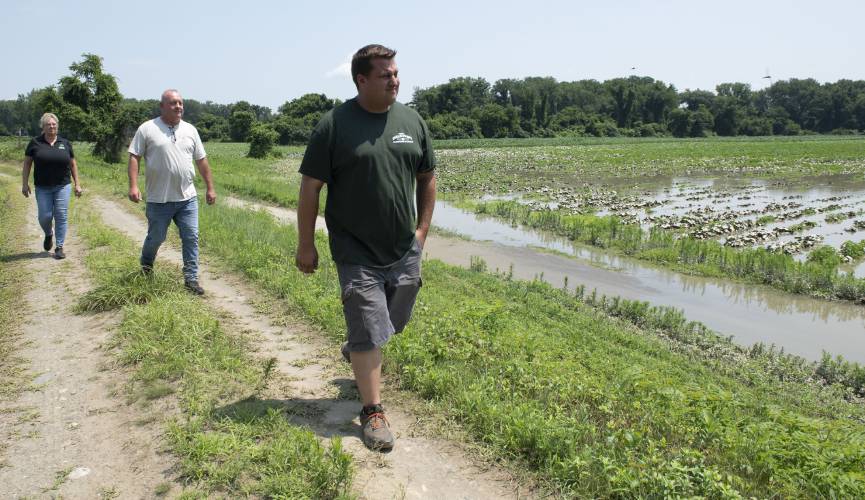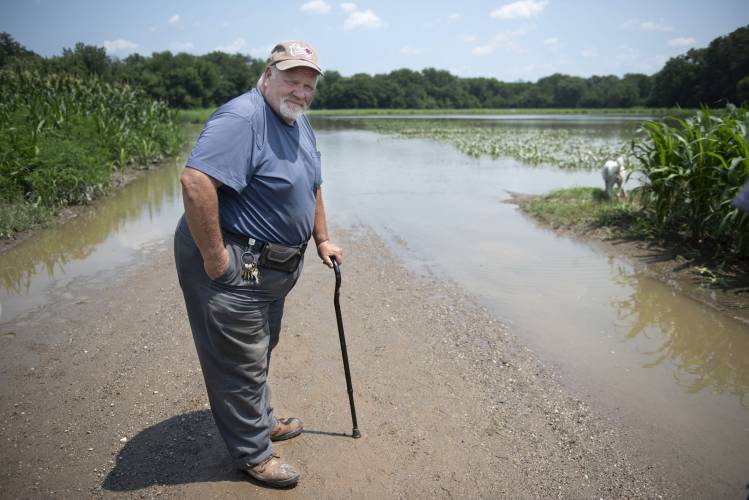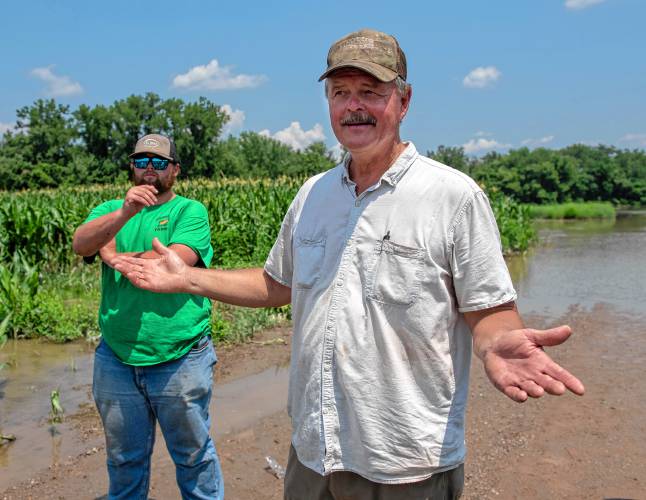Farm fund disburses second round of $3.3M in grants; state announces another $20M in aid
|
Published: 12-12-2023 6:08 PM
Modified: 12-12-2023 6:17 PM |
Western and central Massachusetts farmers are receiving a boost from $23.3 million in disaster relief from a philanthropic fund set up in the wake of July’s devastating floods and further state aid announced by the Healey-Driscoll administration.
The Farm Resiliency Fund — established by the United Way of Central Massachusetts and Gov. Maura Healey’s office after heavy rain in early July caused riverside fields to flood, including hundreds of acres along the Connecticut River — has emptied its coffers and distributed a second round of grants to farmers in need.
In all, the fund has distributed $3.3 million to 228 farmers as of Dec. 4, the Community Fund of Western Massachusetts announced.
At the same time, the state is awarding farmers $20 million in disaster relief, with 347 farmers across western and central Massachusetts — including 45 in Franklin County and the North Quabbin region — receiving assistance.
“It’s helped immensely, all the farmers,” said Wally Czajkowski of Plainville Farm in Hadley, one of the beneficiaries of the Farm Resiliency Fund. “We all have large bills through the end of the year.”
Czajkowski said the flooding reduced his winter squash crop to half what it should have been, and left soil-borne diseases that mean those fields can never be used to grow squash again. Squash, tobacco and asparagus — which likes wet weather — are the farm’s main crops, with fields in Hampshire and Franklin counties.
The Community Fund and the South Deerfield-based Community Involved in Sustaining Agriculture (CISA) have helped administer the Farm Resiliency Fund, which had collected more than $3 million by September from more than 650 individuals and businesses.
An initial round of grants went out Sept. 1 to 214 eligible farmers who submitted qualified applications. Almost all the applicants received $10,000, according to Philip Korman, CISA’s executive director, unless their need was less.
Article continues after...
Yesterday's Most Read Articles
 Bridge of Flowers in Shelburne Falls to open on plant sale day, May 11
Bridge of Flowers in Shelburne Falls to open on plant sale day, May 11
 Serious barn fire averted due to quick response in Shelburne
Serious barn fire averted due to quick response in Shelburne
 $12.14M school budget draws discussion at Montague Town Meeting
$12.14M school budget draws discussion at Montague Town Meeting
 As I See It: Between Israel and Palestine: Which side should we be on, and why?
As I See It: Between Israel and Palestine: Which side should we be on, and why?
 Greenfield homicide victim to be memorialized in Pittsfield
Greenfield homicide victim to be memorialized in Pittsfield
 ‘We are among the leaders’: Ashfield Town Meeting voters pass bevy of clean energy proposals
‘We are among the leaders’: Ashfield Town Meeting voters pass bevy of clean energy proposals
A second round of grants, totaling approximately $1.2 million, has now gone out to some 70 farms, Korman said. Applicants in this round were screened on the basis of need.
“You couldn’t get money in the second round if you got money in the first round unless the need was $80,000 or more,” he noted.
Many of the 70 farms did receive money in both rounds because the need was so great, he said. Amounts distributed were between $5,000 and $35,000.
“We knew [the fund] wouldn’t cover all the losses,” Korman said.
Community Fund CEO Megan Burke said communities came together quickly to help soften farmers’ losses.
“We are grateful for the hundreds of donors that have given to the Massachusetts Farm Resiliency Fund in support of our hardworking farmers,” Burke said in a statement.
Tim Garvin, president and CEO of the United Way of Central Massachusetts, said the fund at this point has given out all the dollars given and pledged, but that’s not to say its work won’t continue.
“When we were asked to stand up the fund it was with the awareness that this will not be the only weather event to affect Massachusetts farmers,” he said.
The partnership and the structure remain, he said, and if more donations come in, they will be held in readiness for the next area of need.
Garvin said administering the fund “was a labor of love,” making special note of the letters of appreciation he had received from farmers.
“None of us knew what to expect when we got involved,” he said. “We soon recognized we were great collaborators, kindred spirits and friends. It has been one of the most rewarding experiences of my life.”
Czajkowski said he thought all the farmers would like to thank the governor, Legislature and the organizations involved in the relief effort.
“And thanks to all the people of Massachusetts, because that’s who bailed us out,” he said.
The United Way fund was focused only on flood damage. State government set up its own Natural Disaster Recovery Program with $20 million from the Legislature’s supplemental budget.
That fund is intended to reimburse farmers for all weather-related crop losses, which included freezes in February and May that blighted the peach and apple crops.
On Monday, Healey announced that immediate assistance would go to 347 farmers in western and central Massachusetts who experienced significant crop losses.
Applicants were required to be a Massachusetts-based agricultural operation growing field crops, hay and forage crops, or produce crops.
Eligible farms had to demonstrate that they suffered losses of greater than 15% of their total planted acreage during one of the 2023 natural disasters.
State Rep. Natalie Blais, D-Deerfield, said the storm damage experienced by farms over the summer was unfathomable.
“This direct financial assistance will go a long way in helping to ensure the continued viability of our farms, thereby maintaining the bedrock of our local food system,” Blais said in a statement. “I stand alongside our farmers in deep gratitude for the prompt response of the Legislature and the Healey-Driscoll administration.”
Nearly $6.7 million from the state’s program is helping farms in the Hampshire, Franklin and Worcester District, said Sen. Jo Comerford, D-Northampton.
“Today, $20 million is being delivered to farmers statewide to assist with recovering and rebuilding from natural disasters,” Comerford said in a statement on Monday.
But that fund, too, will be insufficient to cover the losses.
Phu Mai, communications director for the Massachusetts Department of Agricultural Resources, said the state had received 356 applications from farmers reporting losses valued at $65 million and requesting $42 million in aid.
In August, MDAR estimated at least 148 farms had been impacted by flooding, with more than 2,700 acres in crop losses.




 Community Legal Aid expands Disability Benefits Project to Franklin County
Community Legal Aid expands Disability Benefits Project to Franklin County Wear Orange organizers prepare display to remember gun violence victims
Wear Orange organizers prepare display to remember gun violence victims Deerfield candidates, Whately incumbent discuss issues with voters at South County Senior Center
Deerfield candidates, Whately incumbent discuss issues with voters at South County Senior Center
